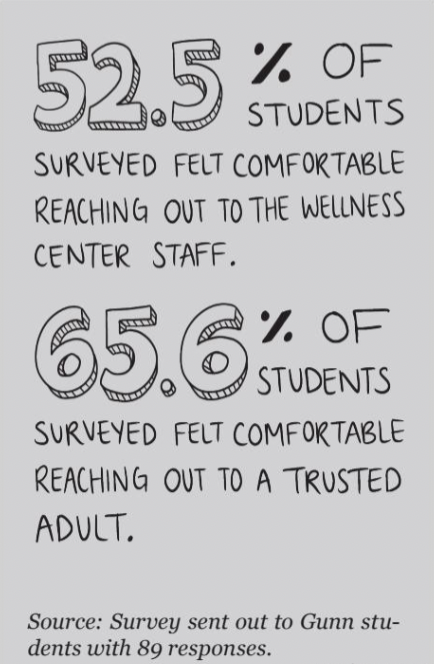PAUSD proposes new mental health programs to support students
The Palo Alto Unified School District (PAUSD) is proposing new plans to further address mental wellness on campus post-pandemic. As students regain familiarity with being fully on-campus, the district’s wellness staff is working on strengthening its services to best serve students.
In the most recent school board meeting on March 22, board members proposed the School-Based Mental Health Program (SBMH) “to offer a comprehensive and coordinated approach by coupling mental health services with other supports already provided in the school setting and establishing a mechanism for supporting student well-being across all dimensions of health.” In summary, this plan would increase wellness staff on PAUSD campuses with support from local mental health agencies, implement early intervention services for mental illness and create school-wide awareness of early signs of mental health struggles.
Sophomore Juan Acosta-Perez, who is working with senior Anika Saraf and junior Abby Kuang on a Youth Community Service project to increase mental health resources to PAUSD students, believes that the current wellness program at Gunn can be improved significantly. “Mental health counselors are a good idea, but [the Wellness Center] is very, very understaffed,” Acosta-Perez said. He also pointed out that the information students are taught during Social Emotional Learning and Functionality (SELF) classes don’t adequately explore mental health issues. “I think many students can agree that [SELF lessons on mental health] are just done to check off a box,” he said. “It’s not very sensitive. [Mental illness] has to do with environment or what somebody might be struggling with at home. It’s such a deep issue that cannot be resolved with one presentation.”
Currently, the wellness staff at Gunn is supported by Counseling and Support Services for Youth (CASSY), which provides resources like on-site counselors to Bay Area schools. Despite this partnership, the Wellness Center is still understaffed to the demand in students requesting wellness services. SBMH intends to bolster wellness staff, especially in elementary and middle schools, and promote personal wellness for students in all grades.
School Board Vice President Jennifer DiBrienza described the specific goals of SBMH. “[We want to] make sure that we provide wellness earlier in the process, before it’s a crisis,” DiBrienza said. “The way that I heard staff talk about it on Tuesday night was [about] creating a culture of wellness. We’re in a school district that is highly academic [and] somewhat competitive. There’s a lot to do; the expectations are high.”
PAUSD Director of Mental Health and Wellness Dawn Yoshinaga explained the proposed timeline. “Our high schools will continue their partnership with external agencies with an additional day of support through Asian Americans for Community Involvement,” she wrote in an email. “As we roll out this first phase of the SBMH program at elementary and middle schools, we will seek input from our high school students, staff and families to design an in-house program that will best meet the mental health needs of our students.”
The program includes a tier list which offers information about how to help low-, moderate- and high-risk students struggling with mental health issues. DiBrienza compared it to the elementary reading levels and resources. “[There are three tiers],” she said. “Tier one, in terms of reading, is like regular reading instruction in elementary school. If you’re talking about mental health, it’s part of the SELF curriculum. Tier two is [if] there are elevated needs. If I’m learning how to read and I’m struggling a bit, maybe I need more than what the classroom teacher is giving everyone. [In terms of] mental health, it’s taking advantage of our counselors. Tier three is an even greater need. [This program would] make sure that we have robust systems so that we’re not just catching kids when they’re at two or three or when they’re in crisis.”
Assistant Principal Michalis Gordon explained that SBMH, as it is now, will not have huge effects on Gunn campus. “It won’t affect us much because we’re still contracting with CASSY,” he said. “It may help with getting us more therapists.”
Your donation will support the student journalists of Henry M. Gunn High School. Your contribution will allow us to purchase equipment and cover our annual website hosting costs.

Senior Becca Wu is an editor of In-Depth, The Oracle's newest section. Outside of staff, she enjoys dancing with the Gunn Titanettes and watching horrible...




